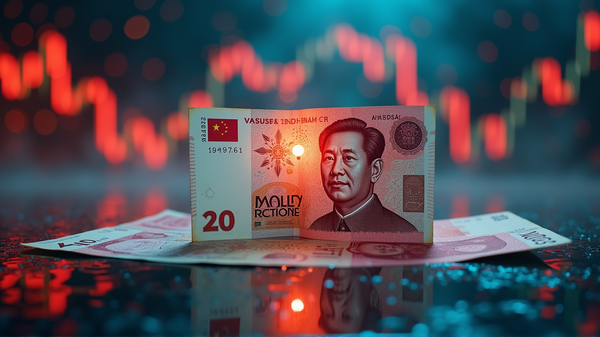How Chinese State-Owned Banks are Responding to US Sanctions Against Russia
In the evolving landscape of international finance and geopolitics, the impact of U.S. sanctions is resonating far beyond its intended borders. A recent report by Bloomberg highlights a significant shift in the operations of China's state-owned banks. These institutions are now increasingly wary of investing in Russia, following the introduction of U.S. sanctions against companies aiding the Russian Federation. This development marks a notable change in the dynamics of international banking, particularly in the context of the complex relationship between China, Russia, and the United States.
Tightening Restrictions
The crux of the matter lies in the new measures taken by Chinese lenders. They are now intensifying restrictions on financing clients from Russia, a move that underscores the growing caution in the global banking sector towards dealings with Russian businesses. The banks are conducting thorough checks to determine if businesses are registered in Russia or if Russians are the ultimate beneficiaries. This heightened scrutiny is a clear indication of the banks' efforts to align with international regulatory standards and avoid potential repercussions from U.S. sanctions.
Impact on Military-Connected Clients
The implications of these tightened controls are significant, particularly for clients connected to the Russian military sector. Chinese lenders have made it clear that they will sever ties with such clients, a decision that applies across all currencies and transaction locations. This blanket approach indicates the seriousness with which Chinese banks are taking the risk of secondary sanctions. The move is not without precedent; Chinese financial institutions have historically been cautious in their international dealings, especially when there is a risk of entanglement in geopolitical disputes.
Anonymity and Caution
Bloomberg's report, while comprehensive, maintains the anonymity of the involved banks. This discretion likely reflects the sensitive nature of the information and the banks' desire to avoid direct confrontation or attention in this geopolitical issue. The decision to withhold names also speaks to the broader trend of caution and risk-averse behavior in the global banking sector, especially when it comes to dealings that might attract political scrutiny or controversy.
Historical Context
The roots of these restrictions can be traced back to the beginning of 2022, when initial measures were put in place. However, these earlier restrictions were not as stringent and left room for circumvention. The current scenario, with the risk of secondary sanctions now a significant concern, represents a shift in the operational approach of Chinese state-owned banks. This change is reflective of the broader geopolitical tensions and the complex interplay between major global powers.
Conclusion
The tightening of restrictions by China's state-owned banks is a clear indication of the ripple effects of U.S. sanctions in the global financial system. It underscores the interconnected nature of international finance and the far-reaching impact of geopolitical decisions. For Russia, this development represents a tightening of the economic noose,
as it increasingly finds itself isolated from major global financial networks. For China, it is a balancing act between maintaining its own strategic interests and adhering to the prevailing international financial norms shaped largely by the West.
The Balancing Act
China's position in this situation is particularly intriguing. As a major global economic power and a close ally of Russia, China finds itself in a delicate position. On one hand, it seeks to support its ally and maintain strong bilateral relations. On the other hand, China must navigate the complexities of international finance, where adherence to sanctions and regulatory norms is crucial for maintaining access to global markets. This balancing act is evident in the actions of its state-owned banks, which are being cautious not to jeopardize their standing in the global financial system.
Broader Implications
The actions of Chinese banks have broader implications for international trade and finance. They signal an increasing recognition of the power of U.S. sanctions and the risks associated with non-compliance. This is a notable development in the context of the U.S.-China economic rivalry, where financial and trade policies are often used as tools of geopolitical strategy.
Impact on Russian Businesses
For Russian businesses, especially those connected to the military sector, the tightening restrictions mean reduced access to crucial financing options. This could lead to significant challenges in terms of capital availability, impacting their operations and growth prospects. The decision by Chinese banks to cut ties in any currency and location further limits the financial maneuverability of these Russian entities.
Global Financial Landscape
This development is also indicative of the evolving nature of the global financial landscape. As geopolitical tensions rise, financial institutions are increasingly becoming conduits through which international policies are enacted. The actions by Chinese banks reflect a growing trend where financial decisions are deeply intertwined with political considerations.
Future Outlook
Looking ahead, the situation poses several questions about the future direction of international finance and geopolitics. How will Russia adapt to this increasingly restrictive financial environment? Will China find new ways to support its ally without attracting sanctions? And how will the U.S. respond to these shifting dynamics? The answers to these questions will shape the international order in the years to come.
Conclusion
In conclusion, the tightening of restrictions by China's state-owned banks on financing Russian clients is a significant development in the realm of international finance. It reflects the complex interplay of geopolitics, economics, and the power of sanctions in shaping global financial relations. As the situation evolves, it will be crucial to monitor how these changes impact the global financial landscape and the strategic decisions of major world powers.




